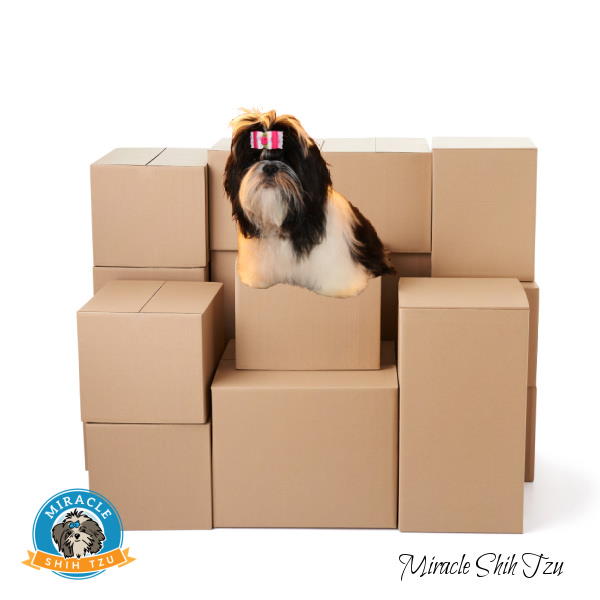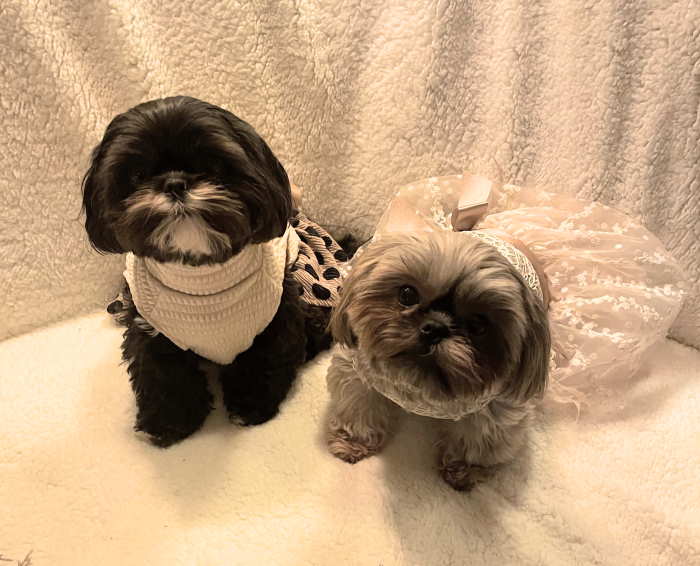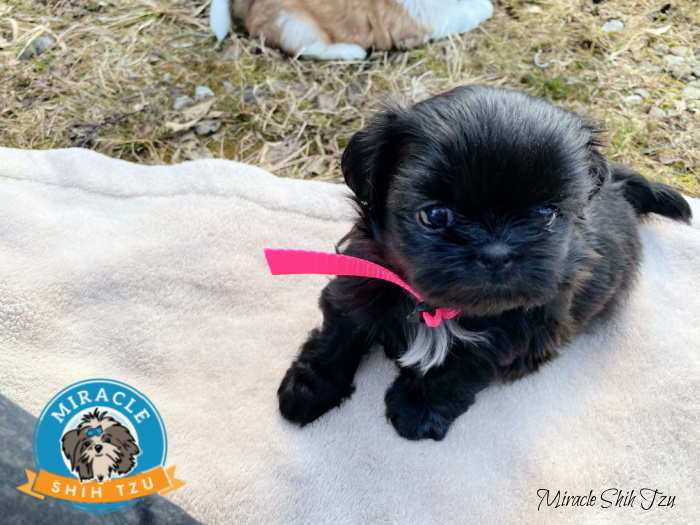- Home
- The Shih Tzu Lifestyle
- Moving With Dogs
Moving With Dogs: How To Help Your Dog Adjust To A New Home
Moving with Dogs
According to American Community Survey (ACS) data, over 40 million Americans moved every year in the last five years, which equates to 13%. Most moves are local within the same state or different states, with people searching for better jobs, bigger or more affordable houses, or better living conditions. In 2019 about 13% of people moved from one state to another. Relocation is a common occurrence, and just as we humans need better and more comfortable homes, our dogs shouldn't be left behind, as they serve a vital purpose in our lives.
Pets complement our whole lives, so we should think of them when planning to move on to a new home. Like humans, pets love a comfortable environment. Some dogs may feel uneasy in a new environment, which is why pet owners must take concrete steps to ensure that their fur babies adapt to their new surroundings. Here's what you can do to help your dog adjust to the new home.
 Moving With Your Dog
Moving With Your DogStick To Your Regular Routines
Research has proven that a dog takes 21 to 28 days to form a habit after several routine practices. Recent studies on the neurobiology of dogs show that dogs' brains work similarly to human beings, and creating a routine and sticking to it creates normalcy.
Make sure you keep up with the routines you used to do in your old home. If you fed your dog at a specific time, had walks in the evening, or playtimes with your dog in the morning, ensure you stick to that. Do not try new feeds during the adjustment period. The regular routines will make them adapt faster to their new surroundings and lessen stress.
Gia Bufalino, the owner of two very photogenic Shih Tzu dogs, LeeLoo and Lyra recently made a big move and here is what she had to say about dogs and routines.
Routines are another big part of the transition. Bedrooms are upstairs now so we give them their Greenies the same way each night but in the office now. Meals are at the same time as before, followed by the same Wag chicken and waffles treat for dessert.
Even though I am completely overwhelmed with all of the cleaning and unpacking I still take the time for all of the normal playtime moments with the girls, and I make myself take breaks to cuddle them on the couch, walk around the house with one of them on my hip like a baby, play tug of war on the floor, or sit down and make a blanket tent for them while I read.
 LeeLoo and Lyra Getting Ready for the Big Move
LeeLoo and Lyra Getting Ready for the Big MoveEnsure The Space is Comfortable
Comfort is one of the primary things most people look for when buying a new home. So when you do find the home of your dreams, set up a comfortable space for your dog immediately after moving in to put him at ease. The area can be in a corner of your home, or even a particular room.
The space should have rugs and blankets with the same smell as your old home. You can also try adding familiar scents to your new house. For instance, if you’ve always used an oil diffuser or you’ve always lighted scented candles in your former home, use it again in your new home to give your pet a sense of familiarity.
Try to arrange furniture in certain parts of your home in the same way as your old home so your dog can feel at ease, then gradually make changes as your dog becomes more comfortable in your new place.
Ensure that your pooch’s space has access to fresh drinking water, has proper ventilation, and is clean and free from any sharp objects or other items that may be hazardous to your dog’s health. Also, ensure that your pet has his favorite playthings with him. Make sure to take your dog’s toys with you when you move so your pet can have something familiar to play and cuddle with in your new abode.
Gia was spot on in this area. Here is what she did for her girls.
Once the large furniture was in its place, regardless of the countless boxes that surround all of it, we put their beds in their new spots in each room so they could get used to that as well.
That made a huge difference to have their living room bed in the new living room at the base of the same couch, their office bed in the corner of my new office at the crook of the same bookshelves, their dining room bed in the new dining room next to the same rug they love to lounge on.
We also didn't wash anything before we brought it over to the new house, such as all the bedding (I am looking forward to finally getting to put fresh linens on our bed after almost two weeks) because they sleep in the bed with us, the throw blankets on the couch that they constantly steal so those are on a perpetual laundry rotation anyway, our "lounge at home" clothing while we unpack and get situated.
 Moving with Dogs: Two Shih Tzu dogs, LeeLoo and Lyra find comfort in their new home.
Moving with Dogs: Two Shih Tzu dogs, LeeLoo and Lyra find comfort in their new home.When Moving with Dogs, Give Your Dog Time To Explore
Take your dog around the house room by room and let the dog sniff around the corners to be familiar with the new home. Give them ample time with every room, but ensure all doors leading outside are closed until they get accustomed to the new house. However, do not leave your dog home alone.
You can take shifts in watching the dog with a person who is familiar with the dog. This may be a bit of a challenge, especially if you and your kids are also still trying to adapt to your new place and community.
However, it is important to work out a schedule to ensure that your pet doesn’t feel uneasy or afraid in your home. Once your dog has adjusted to your new place, you may consider hiring a dog sitter or dog walker to help you look after your fur baby.
Since we began unpacking (though we are still bringing stuff over from the old place) I take Leeloo and Lyra with me to each room and I bring a small pile of toys for each room.
I create random pathways around the furniture through the many boxes and make it like a game to get them used to the new set-up as none of the rooms are the same as before.
I have done all of this so they can explore, sniff and recognize all the familiar furniture, objects and items while learning and adjusting to the new "packaging" of the same ol' home.
When Moving with Dogs, Provide for Plenty of Exercise
A tired dog is a calm dog. Make sure to play with your dog around the new home. Present the home as a fun place to be, and they will get to adjust. You can also take him around the neighborhood and explore with him as you stick to your routines.
Take him for those evening or morning walks to explore the area so he'll get a feel of the neighborhood. Playing will make him feel more comfortable and adjust to the schedules and the home more efficiently.
If your kids will be taking your pet for a walk, remind them to stay close to home and avoid busy streets to avoid accidents. You should also do your research to know if there are dog-friendly parks or other places of interest that welcome dogs in your community so you’ll have plenty of other places to explore apart from your neighborhood.
 Moving with Dogs: Don't neglect exercise during the move.
Moving with Dogs: Don't neglect exercise during the move.Be Patient When Moving with Dogs
It’s normal to feel frustrated if your dog seems anxious, whiny, or sad in your new home. However, it’s important to be patient, since it will take time for your pet to adjust to your new home.
Spend more quality time
with him, like playing on the floor with him, rubbing his belly, and assuring
them that everything will be okay. You may notice a sudden behavior change with
your dog, but don't flip out. The process might be slow, but they eventually
adapt to the new home with your support and love.
It will take a few weeks, if not days, for your dog to adjust and get acquainted with the new home. Treat them with love and support, just as you would with a small child. Just like humans, dogs also need to feel safe around their environment. Reinforce positive behavior, and they will indeed adjust.
LeeLoo and Lyra are now settled in their new home and anxiously awaiting the arrive of their new baby sister, Lakhi.
Moving to Europe With Your Dog
Moving down the street with your dog doesn't pose as many obstacles as, say, a cross-country move. However, if you are in the US or elsewhere in the world, relocating to Europe can present new challenges. Each country has its own unique legal requirements and specific cultural differences that pet owners should be aware of. According to Remitly, researching each country's entry and living requirements for pets will help make the transition go smoothly.
 This is Lakhi, the little sister of LeeLoo and Lyra, all Miracle Shih Tzu Dogs
This is Lakhi, the little sister of LeeLoo and Lyra, all Miracle Shih Tzu DogsMeet LeeLoo and Lyra and Their Mom Gia
Gia Bufalino lives with her family and Shih Tzu dogs in New York State. Meet Gia and her babies at The Fluff Element and don’t forget to follow.
"Hi, I'm Janice Jones, a former veterinary technician and Shih Tzu expert with over 40 years of experience with the breed. Through Miracle Shih Tzu, I combine my medical background and extensive breed knowledge to provide reliable, practical advice for Shih Tzu owners. My mission is to help you give your Shih Tzu the happiest, healthiest life possible through evidence-based information and real-world solutions. Whether you're new to the breed or a seasoned owner, you'll find trusted guidance here for all aspects of Shih Tzu care.
I hold an undergraduate degree in Psychology with a minor in biology, Early Childhood Education, and Nursing, and a Master's in Mental Health Counseling.






